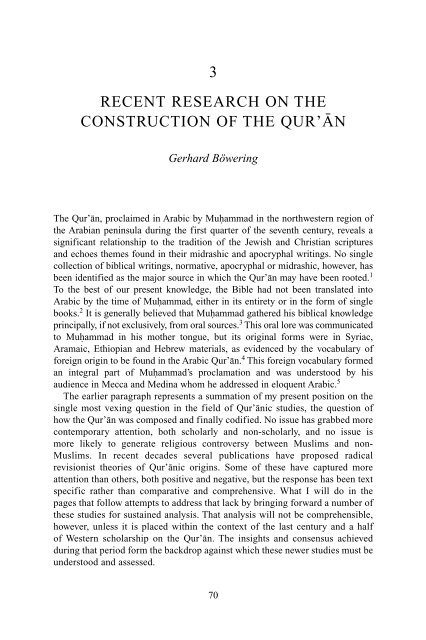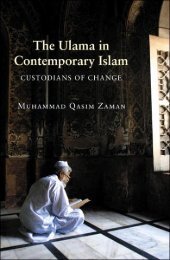The Qur'an in its historical context (pdf - Islam and Christian-Muslim ...
The Qur'an in its historical context (pdf - Islam and Christian-Muslim ...
The Qur'an in its historical context (pdf - Islam and Christian-Muslim ...
You also want an ePaper? Increase the reach of your titles
YUMPU automatically turns print PDFs into web optimized ePapers that Google loves.
3<br />
RECENT RESEARCH ON THE<br />
CONSTRUCTION OF THE QUR’AN<br />
Gerhard Böwer<strong>in</strong>g<br />
<strong>The</strong> Qur’an, proclaimed <strong>in</strong> Arabic by Muhammad <strong>in</strong> the northwestern region of<br />
the Arabian pen<strong>in</strong>sula dur<strong>in</strong>g the first quarter of the seventh century, reveals a<br />
significant relationship to the tradition of the Jewish <strong>and</strong> <strong>Christian</strong> scriptures<br />
<strong>and</strong> echoes themes found <strong>in</strong> their midrashic <strong>and</strong> apocryphal writ<strong>in</strong>gs. No s<strong>in</strong>gle<br />
collection of biblical writ<strong>in</strong>gs, normative, apocryphal or midrashic, however, has<br />
been identified as the major source <strong>in</strong> which the Qur’an may have been rooted. 1<br />
To the best of our present knowledge, the Bible had not been translated <strong>in</strong>to<br />
Arabic by the time of Muhammad, either <strong>in</strong> <strong>its</strong> entirety or <strong>in</strong> the form of s<strong>in</strong>gle<br />
books. 2 It is generally believed that Muhammad gathered his biblical knowledge<br />
pr<strong>in</strong>cipally, if not exclusively, from oral sources. 3 This oral lore was communicated<br />
to Muhammad <strong>in</strong> his mother tongue, but <strong>its</strong> orig<strong>in</strong>al forms were <strong>in</strong> Syriac,<br />
Aramaic, Ethiopian <strong>and</strong> Hebrew materials, as evidenced by the vocabulary of<br />
foreign orig<strong>in</strong> to be found <strong>in</strong> the Arabic Qur’an. 4 This foreign vocabulary formed<br />
an <strong>in</strong>tegral part of Muhammad’s proclamation <strong>and</strong> was understood by his<br />
audience <strong>in</strong> Mecca <strong>and</strong> Med<strong>in</strong>a whom he addressed <strong>in</strong> eloquent Arabic. 5<br />
<strong>The</strong> earlier paragraph represents a summation of my present position on the<br />
s<strong>in</strong>gle most vex<strong>in</strong>g question <strong>in</strong> the field of Qur’anic studies, the question of<br />
how the Qur’an was composed <strong>and</strong> f<strong>in</strong>ally codified. No issue has grabbed more<br />
contemporary attention, both scholarly <strong>and</strong> non-scholarly, <strong>and</strong> no issue is<br />
more likely to generate religious controversy between <strong>Muslim</strong>s <strong>and</strong> non-<br />
<strong>Muslim</strong>s. In recent decades several publications have proposed radical<br />
revisionist theories of Qur’anic orig<strong>in</strong>s. Some of these have captured more<br />
attention than others, both positive <strong>and</strong> negative, but the response has been text<br />
specific rather than comparative <strong>and</strong> comprehensive. What I will do <strong>in</strong> the<br />
pages that follow attempts to address that lack by br<strong>in</strong>g<strong>in</strong>g forward a number of<br />
these studies for susta<strong>in</strong>ed analysis. That analysis will not be comprehensible,<br />
however, unless it is placed with<strong>in</strong> the <strong>context</strong> of the last century <strong>and</strong> a half<br />
of Western scholarship on the Qur’an. <strong>The</strong> <strong>in</strong>sights <strong>and</strong> consensus achieved<br />
dur<strong>in</strong>g that period form the backdrop aga<strong>in</strong>st which these newer studies must be<br />
understood <strong>and</strong> assessed.<br />
70



